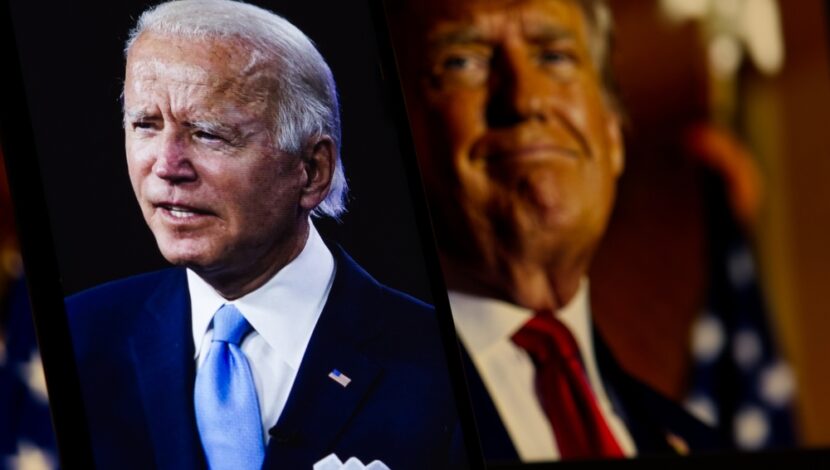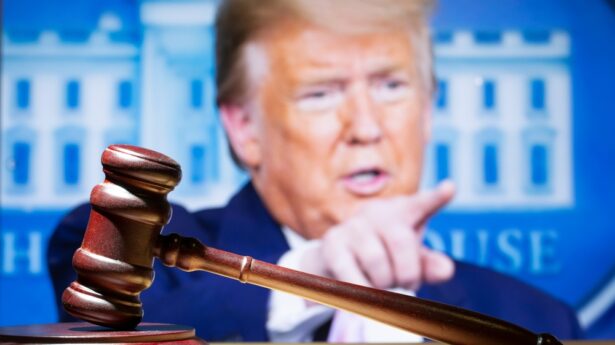The Unitarian Universalist Service Committee advances human rights through grassroots collaborations.
3 Lies and Missed Opportunities from the First Presidential Debate

By Josh Leach on June 28, 2024
At the first debate of the 2024 U.S. presidential election, hosted by CNN, the two leading contenders for office turned in disappointing performances that raise troubling questions about the country’s future.
In response to almost every question he received about the challenges facing the country, Republican candidate Donald Trump attempted to pin the blame on undocumented immigrants and asylum-seekers. Meanwhile, Democratic incumbent Joe Biden largely failed to rebut or challenge these ludicrous assertions, while doubling down on his own misguided policies—like the asylum ban—that also violate the rights of people in migration.
As a result, terrible slanders about innocent people were allowed to stand uncorrected; and neither candidate emerged from the debate stage as a champion of human rights. Here are three of the most glaringly false statements and missed opportunities from the evening’s event, and how politicians can rectify them in future:
Lie #1: Trump again falsely stereotyped asylum-seekers as “criminals”
Candidate Trump—who was himself convicted on 34 felony counts just weeks ago—again falsely tarred people in migration as criminals, despite all evidence to the contrary. Absurdly, he repeated his stock claim that asylum-seekers are coming from “prisons and mental hospitals,” stating that newly-arriving immigrants from the Global South are responsible for introducing a wave of so-called “migrant crime” into the country.
These attempts to stigmatize and dehumanize people in migration are in line with Trump’s other recent incendiary comments. Last week, for instance, Trump floated the idea of a separate martial arts league for immigrants, because—as Trump put it—they are “nasty, mean” people. The former president appeared to envision that asylum-seekers would be pitted against each other in a sort of gladiatorial combat, for the amusement of U.S. citizens.
Missed opportunity: Biden could have easily refuted Trump’s preposterous allegations.
It should not have been hard for Biden to cite facts that demolish Trump’s claims. Outside of Trump’s alternative version of reality, people in migration—including undocumented ones—commit fewer crimes on average than U.S.-born citizens. Immigration in all forms is associated with lower, not higher, crime rates. And (at least Biden made this point) there is zero evidence that any of the recently-arriving asylum-seekers in the United States are coming from either “prisons” or mental health facilities.
Even if these statistics did not all contradict Trump’s absurd claims, moreover, his comments are immoral and dangerous in any case—and rival politicians should not hesitate to point this out.
Lie #2: Trump falsely blamed immigrants for the country’s economic woes.
Trump used almost every question about the economy last night as another excuse to bash people in migration. When asked how he would keep the U.S. Social Security program solvent for future generations, for instance, Trump falsely claimed that the greatest threat to the program’s fiscal sustainability is immigration. Likewise, when forced to acknowledge the rapid job growth the U.S. economy has enjoyed in recent years, Trump spun this fact by saying that recent immigrants “will take the jobs,” and that the only economic opportunities created in recent years have gone to them.
Missed opportunity: Biden should have highlighted the positive contributions of immigrants.
Trump’s claims about immigrants harming the economy are not only false—they are the polar opposite of the truth. All groups of immigrants, including undocumented ones, pay far more into programs like Social Security than they will ever receive back. This is because noncitizens—even those with permanent status—are ineligible for most public benefits, for their first several years in the country.
Immigrants also tend to be working-age adults, in contrast to the U.S.-born public, which is rapidly aging. The real threat to the solvency of the Social Security and Medicare programs, therefore, comes from the risk of having too few immigrants, not too many. An aging U.S. public will need to draw increasingly on these programs in the years ahead, unless more young adults enter the workforce and pay into the system. Immigration, therefore, is a solution to these fiscal problems—not a cause of them.
Similarly, recent levels of higher immigration have been associated with rapid job growth, declining inflation, and a rise in real wages that benefits everyone in the U.S. economy. Trump’s claims that immigrants are making things worse for U.S.-born Americans are therefore categorically false. They are a blatant attempt to scapegoat a group of people who are struggling just as much as other Americans, and who have the same justified desire as everyone in the country for a living wage, shelter, health care, and basic social justice.
For these reasons and others, Biden could rightly have said that immigrants and asylum-seekers are better patriots who have contributed more to U.S. society than the convicted felon Donald Trump ever will. Instead, he missed this opportunity and allowed some of Trump’s false allegations against people in migration to stand uncontested.
Lie #3: Trump misleadingly downplayed the threat he poses to democracy.
Trump doubled down on his false claims that the 2020 election was stolen and misrepresented his own role in the events of January 6, 2020, when his supporters stormed the U.S. Capitol in an attempt to stop the certification of the election results. He also insulted the leader of U.S. allied nation Ukraine, Volodymyr Zelenskyy—characterizing him as a huckster who has cheated American taxpayers—when in reality, Zelenskyy and the other people of Ukraine are fighting a life-or-death struggle to defend their country from an unprovoked invasion.
In all of these ways and others, Trump showcased—once again—his admiration for authoritarians and his own pronounced autocratic tendencies.
Trump also misrepresented other key parts of his legacy on human rights. For instance, Trump bizarrely claimed that he had the “best environmental numbers ever,” during his presidency—even though he reversed U.S. and global progress toward combating climate change.
Missed opportunity: Biden failed to present himself as a champion of human rights.
Biden, to his credit, did criticize Trump for withdrawing from the Paris climate agreement and called attention to the need for robust climate action. Yet, he failed to articulate a coherent overall commitment to advancing human rights around the globe.
During one particularly ugly moment, Trump accused Biden of “being like a Palestinian” in his approach to the Gaza war; in other words, Trump treated the name of an entire ethnic group and nationality as if it were an insult. In his response, Biden failed to condemn this blatant anti-Arab and anti-Palestinian racism. Moreover, neither candidate addressed the horrendous human suffering that Palestinian civilians have faced in the Gaza war—including death from bombing and starvation—which was continuing even as both men spoke from the debate stage.
In all of these ways and others, both candidates seemed to embrace—or at least, to leave unchallenged—a false narrative that blamed the country’s problems on religious and ethnic minorities. Such rhetorical scapegoating is incredibly dangerous. Amidst reports of increased Islamophobic and antisemitic hate crimes across the country, such slanders against minority populations send the message that hateful violence is acceptable.
Moreover, scapegoating innocent people for the country’s challenges does a disservice to all U.S. voters. It distracts from the real problems we are facing and the need for all communities to act in solidarity to address them. As UUSC’s grassroots partners have shown time and again, it is actually possible for people to work across their differences to advance the human rights goals we all share: a liveable climate, a fair wage, and the right to live in safety and dignity. Politicians should emphasize this message of unity, not blame innocent people for problems they did nothing to cause, and from which they are suffering just as much as other Americans.
No matter what the politicians say—of any party or ideology—UUSC will continue fighting for a vision of a world where human rights are enjoyed by all. You can support our work to advance this vision of equity and global solidarity with a contribution in any amount. You can also sign up for other updates on our work by joining our email list here.
Image credit: Shutterstock (Below the Sky)

